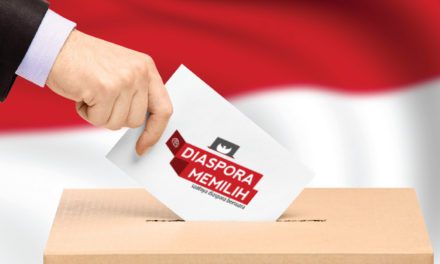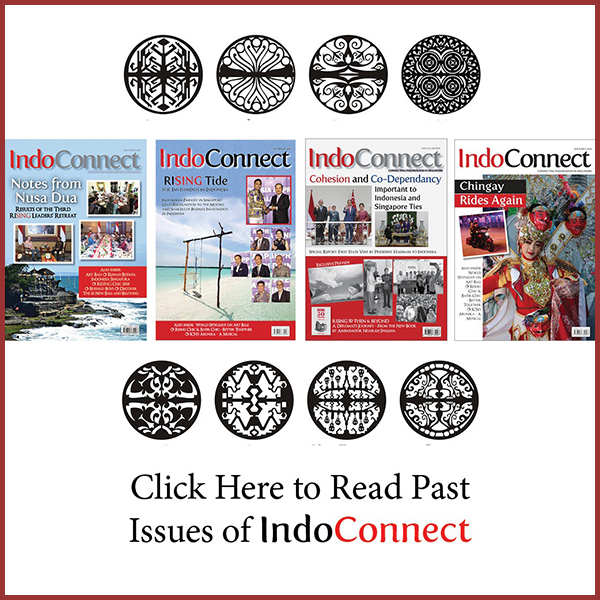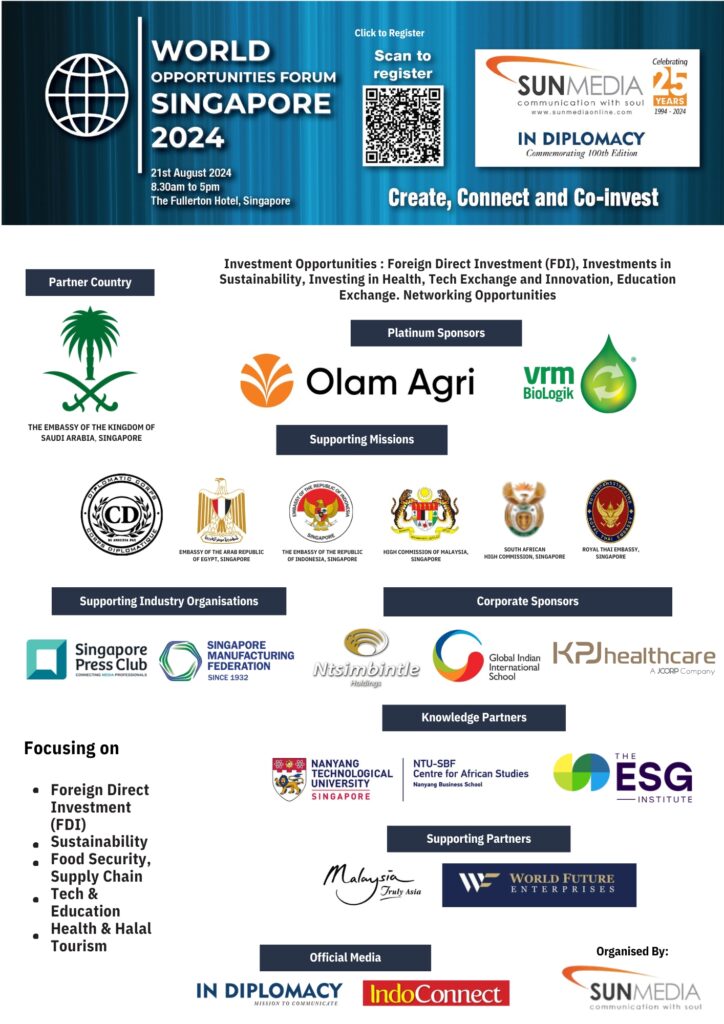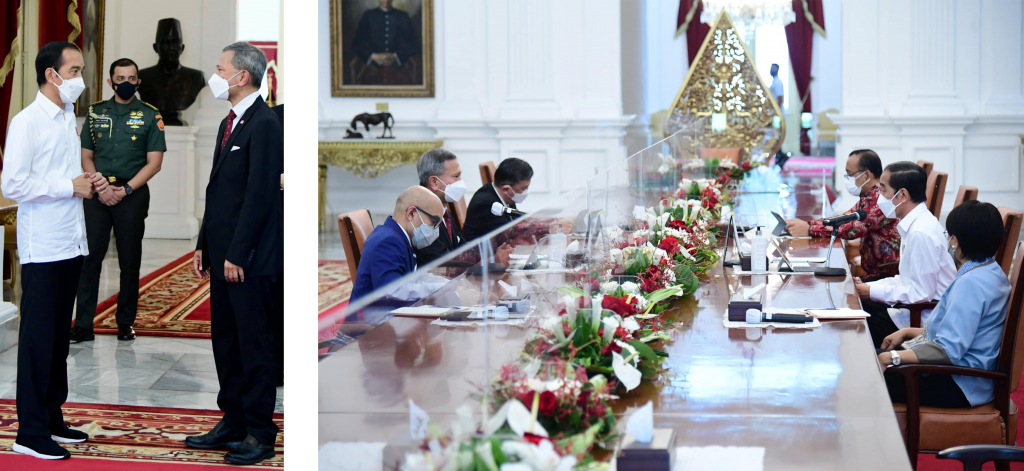
(Above row): Foreign Minister Dr V. Balakrishan with President Joko Widodo at Istana Merdeka (Photo: Biro Pers Sekretariat Presiden)
A hectic, very busy but fulfilling and fruitful two-day visit. In a media wrap up at the Singapore Residence in Jakarta, the Foreign Minister shared highlights of his visit
Foreign Minister Dr Vivian Balakrishnan had the opportunity to meet the President, Pak Joko Widodo to discuss the Leaders’ Retreat between President Jokowi and Prime Minister Lee Hsien Loong. The Minister said, “We agreed we will hold it this year. We agreed that it will be hosted by Indonesia, and that it will almost certainly be in Bintan. What we need to sort out now is the exact dates. We will continue to settle the agenda, the details of the projects and items to be discussed. We also want to give a chance for the vaccination programmes and safe travel measures in Bintan and us (Singapore), to be better coordinated. Hopefully, that will mark the start of a new phase in the options for travel.”
The Singapore Foreign Minister also had the opportunity to meet the Coordinating Minister for Maritime Affairs and Investments Pak Luhut Pandjaitan, and the Coordinating Minister for Economic Affairs Airlangga Hartarto. He also met his counterpart, Minister of Foreign Affairs Ibu Retno Marsudi. From the finance side, he met Minister of Finance Sri Mulyani Indrawati and on tourism, Minister of Tourism and Creative Economy Sandiaga Uno. Other cabinet members included Mr Erick Thohir, the Minister of State-Owned Enterprises and he also had a breakfast meeting with the Governor of Jakarta, Mr Anies Baswedan.”
“President Joko Widodo was also particularly seized with this question of the green economy, and the opportunities that the green economy presents for Indonesia, in terms of Indonesia’s access to hydropower, wind, geothermal, solar panels, and how the economics of renewable energy have been transformed in the last five to ten years.”
In the media wrap he also shared some observations on the state of relations with Indonesia: “First, our relations with Indonesia are in a very, very good state. Despite the challenges of last year with COVID-19, we have stayed in close touch. We have supported each other mutually. We have made sure supply chains continued to flow, especially for products such as essential drugs, medication, and PPE (personal protective equipment). In the early phase of the crisis, we were also supplying PCR machines, reagents and other essential supplies that were in critical shortage at that point in time. Now, we are in a different phase. Both in Singapore as well as Indonesia, the COVID-19 situation is much better than it was a year ago. The other key development in both countries is the rollout of vaccinations. In both countries, vaccination is key to the post-COVID-19 recovery. What I also wanted to do here was to compare notes, share experiences in terms of the delivery of vaccines to the population – how fast and how to do it. Of course, the challenges in Indonesia are far greater and far more complex than in Singapore. But still, it is a useful exercise in its own right.”
In other matters related to COVID, the Singapore Minister said he wanted to start initial conversations about how health authorities will be able to recognise and verify health records related to vaccination status, serology status if applicable, PCR tests. He pointed out that this requires each country to set up its own national system (which Singapore has) and then to be able to exchange relevant information, when necessary, with consent. This he said will help enable the future resumption of safe travel between Indonesia and Singapore. He had also held similar discussions with Malaysia, and with Brunei. He hoped these initial bilateral discussions can eventually be generalised into a regional series of arrangements, which will, hopefully, in the not-so-distant future, enable people to travel again – to travel for business, studies, social reasons, family reasons, and even tourism when the situation improves.
Indonesia and Singapore also had the opportunity to review matters on the economic front where there has been significant progress. Despite COVID-19, the investment flow from Singapore to Indonesia last year went up by an additional 50%. Singapore remains Indonesia’s largest foreign investor and have been so for the past six years. He observed that in terms of regulatory certainty, in terms of agreements, in terms of investment flow, it has all been very positive. The Indonesian side appreciates this and wants to continue to engage Singapore and to attract more investments.
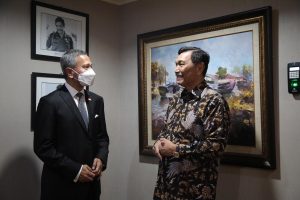
Minister Dr V. Balakrishnan in discussions with Indonesia’s Coordinating Minister for Maritime Affairs and Investments Luhut Pandjaitan
He also observed that there are many opportunities in Indonesia as they roll out infrastructure, and as they prepare for the green economy and highlighted how there have always been opportunities for Singapore companies: “Now, I think, this is another occasion to look for new investment opportunities, even as the economy restructures in Indonesia, and even after COVID-19, as we prepare for a new world which will focus, I believe, on a greater need for resilience. There will be changes in supply chains. I think it is also an occasion for ASEAN, as an economic centre of gravity in its own right, to be emphasised and for us to increase intra-ASEAN trade as well as the way ASEAN engages and trades with the rest of the world. I have had very useful sessions with a very wide range of Ministers in this short visit here.
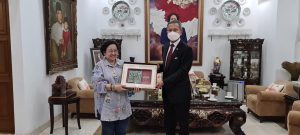
A meeting with the former Indonesian President Megawati Soekarnoputri
The Minister was asked about his interaction with with President Jokowi and elaborated how apart from discussing about the Leaders’ Retreat they also talked about the economy, Myanmar and the discussions that the leaders will need to have. He also revealed President Joko Widodo was also particularly seized with this question of the green economy, and the opportunities that the green economy presents for Indonesia, in terms of Indonesia’s access to hydropower, wind, geothermal, solar panels, and how the economics of renewable energy have been transformed in the last five to ten years.
Many things which, in the past, you could say were almost aspirational or ideological, make perfect economic sense today, and with the proper regulatory frameworks and no fossil fuel subsidies, let technology and market economics work through the system. I think the green economy, not only in Indonesia, but across Southeast Asia, is going to take off in a big way in the next decades to come. This is a very exciting space and President Jokowi recognised that. We had quite a passionate and enthusiastic discussion on this topic.
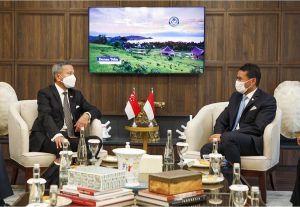
Dr V Balakrishan in a meeting with Indonesia’s Minister of Tourism & Creative Economy Sandiaga Uno
On the topic of a proposed travel corridor between Singapore and Batam Nongsa (and also potentially Bali) that was mentioned by Indonesia’s Minister of Tourism, Mr Sandiaga Uno Dr Balakrishnan replied, “Well, I want to start by quoting Ibu Retno. As we make these arrangements in the context of a recovery from COVID-19, I think the adjectives that should be used are “gradual, safe and cautious”. I think these are very apt adjectives to describe the way we will do so. I would reiterate the point that we need the COVID-19 situation to improve significantly; ideally for Indonesia to achieve the same level of control as we currently have in Singapore. The other point, I emphasise again, is the need for testing, for vaccination especially, and for us to be able to share records – verifiable, authoritative records – in order to enable cross-border travel. This will take some time. That is why I completely agree with Ibu Retno’s point. Let us do it gradually, carefully and cautiously. That is the way to do it. The last thing you want is to run before you are ready and then you get a big cluster and set us back. Have some patience, but rest assured, we are working on this.”



